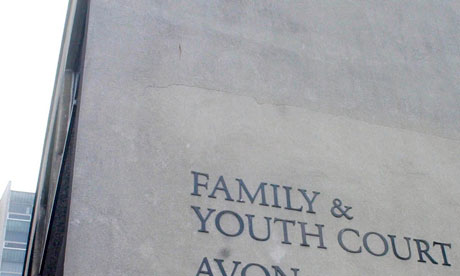
Owen Bowcott
http://gu.com/p/3vhv3/twThe justice committee warns there will be significant implications for family courts caused by government legal aid cuts. Photograph: Barry Batchelor/PA
The increase in unrepresented litigants, predicted as a result of government plans to save £350m out of the annual £1.2bn legal aid bill, will inundate the system with inexperienced and disoriented claimants, the MPs' report on the operation of the family courts says.
Its most serious impact is likely to be in abuse cases where lawyers working on a pro bono basis or even children's guardians have been pressed into service to prevent alleged perpetrators interrogating their victims in court.
That ad hoc provision could be overwhelmed, the justice committee fears, unless extra funds are made available for lawyers.
"The increase in litigants in person will give rise to more cases in which an alleged abuser cross-examines the person he or she is alleged to have abused," says the report, published on Thursday.
"We recommend the Ministry of Justice considers allowing the court to recommend that legal aid be granted to provide a lawyer to conduct the cross-examination in such cases.
"There are currently no rules to prevent litigants in person cross-examining victims of alleged abuse, whether children or adults."
The report says that Sir Nicholas Wall, the head of the courts' family division, advised the MPs that there was no provision in family law to prevent the accused cross-examining a victim.
Mrs Justice Pauffley told the MPs: "The only other way I have seen it managed is for the guardian or the child's representative to shoulder the burden of cross-examining the young person with a list of questions provided by the accused, but that is less than satisfactory."
The committee also fears other repercussions from litigants representing themselves. The report says: "Non-lawyers accessing the family courts can find it a confusing and frustrating experience... The family court will need to become more attuned to dealing with parties representing themselves and this will require procedures and guidance developed to accommodate the challenges posed by larger numbers of litigants in person.
"Currently, only one in 10 separating parents resolves their disputes in court. The evidence we received is that a large number of these parents have multiple problems.
"This means that they are unlikely to be diverted from court by anything other than intensive intervention. In addition, there are many cases involving safeguarding concerns which should not be diverted from court.
"Some parents could be diverted from court by low-level intervention, but the government should be realistic about the impact of any proposals on the number of private law cases reaching court."
The justice committee says adequate provision has not been made for mediation, the cheaper resolution process the government is eager to promote.
"We are concerned that the government may not have budgeted for enough additional mediations in its legal aid proposals. With more than 200,000 people losing eligibility for legal help and representation, the department's prediction that only 10,000 extra mediations will be required seems low."
The committee expressed strong opposition to increasing media access to the family courts. "Our witnesses were united in opposing implementation of the scheme to increase media access to the family courts contained in the Children, Schools and Families Act 2010," the report says. "While their reasons for doing so differed, and were sometimes contradictory, such universal condemnation compels us to recommend that the measures should not be implemented, and the Ministry of Justice begin afresh. We welcome the government's acknowledgement that the way the legislation was passed was flawed, and urge ministers to learn lessons from this outcome for the future."
The committee's chairman, Sir Alan Beith, said: "Many family disputes could be better dealt with by mediation than in a court. However, there will still be cases which go to court and there will be significantly more litigants in person following changes to legal aid.
No comments:
Post a Comment